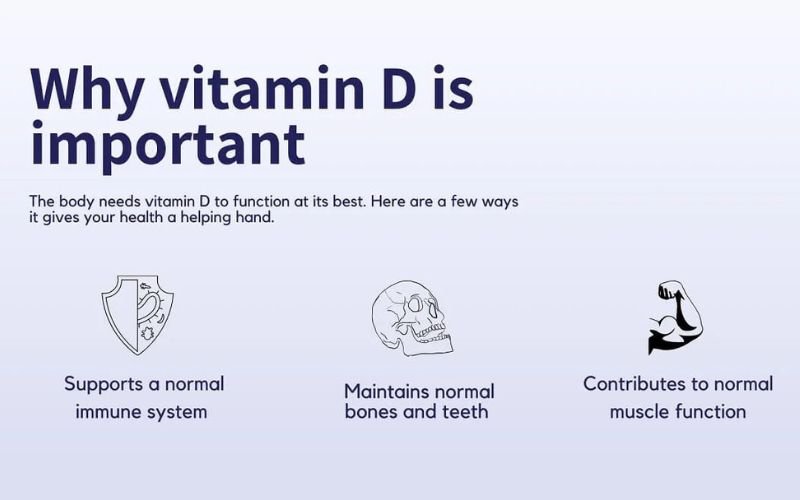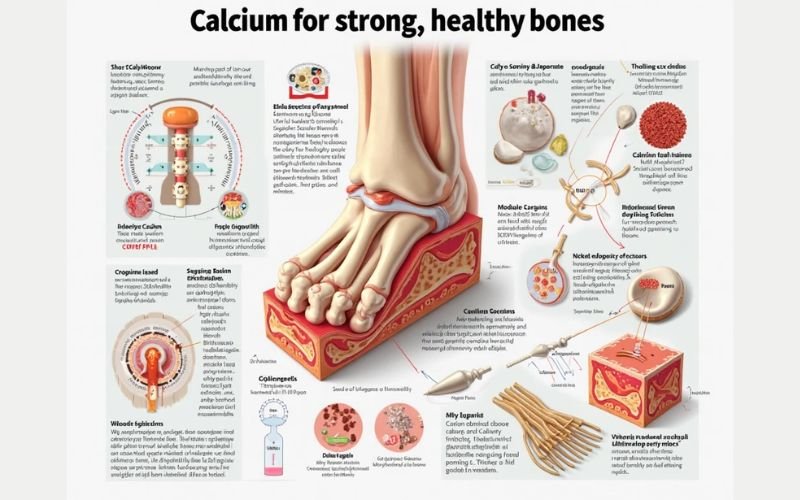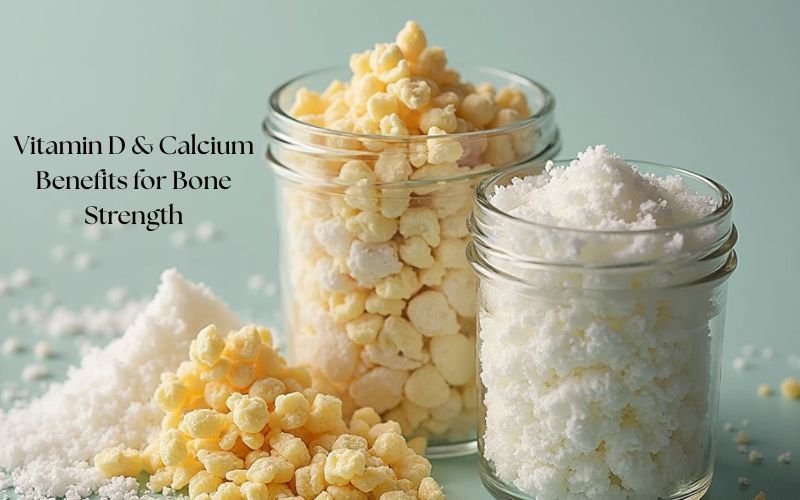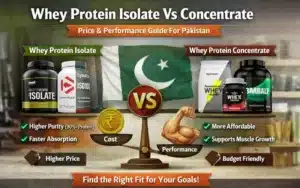No products in the cart.
Return To ShopVitamin D and Calcium Benefits for Bone Strength: A Complete Guide
In today’s fast-paced world, many of us don’t think about our bone health until it’s too late—after an injury, a fracture, or a diagnosis like osteoporosis. But here’s the good news: with the right nutrients—particularly vitamin D and calcium—you can build and maintain stronger bones throughout life.
This article explores the vitamin D and calcium benefits for bone strength, why these two nutrients are essential partners, and how you can optimize your intake for better bone density and overall health. Whether you’re in your 20s aiming to build peak bone mass or in your 50s and looking to prevent bone loss, this guide offers actionable, research-backed advice.
What is Vitamin D and Why It’s Important for Bones

Vitamin D, often called the “sunshine vitamin,” is a fat-soluble vitamin that helps your body absorb calcium—a critical building block of bone tissue.
Key roles of vitamin D in bone health:
- Enhances calcium absorption in the intestines
- Maintains appropriate blood calcium and phosphate levels
- Supports bone growth, remodeling, and repair
- Helps prevent rickets in children and osteomalacia in adults
Without sufficient vitamin D, your body cannot absorb enough calcium from food, weakening bones and increasing the risk of fractures.
The Role of Calcium in Bone Health

Calcium is the most abundant mineral in your body—99% of it is stored in your bones and teeth. It provides the structural strength needed to keep bones dense and resilient.
Functions of calcium for bone health:
- Provides the rigid framework of bones
- Essential for bone mineralization
- Critical for bone density maintenance as you age
- Supports the healing of bone fractures
Without adequate calcium, your body may pull calcium from bones, leading to bone thinning and a higher risk of osteoporosis.
How Vitamin D and Calcium Work Together for Strong Bones
Vitamin D and calcium work synergistically—you need both to maintain optimal bone health:
- Vitamin D3 (cholecalciferol) promotes calcium absorption from your diet.
- Without vitamin D, even if you consume enough calcium, your body won’t be able to use it effectively.
- Combined, these nutrients help maintain bone mass, promote bone density, and support lifelong skeletal health.
Numerous studies show that supplementing with both vitamin D and calcium can help prevent fractures and slow bone loss, particularly in older adults and postmenopausal women.
Scientific Evidence: Studies Supporting These Benefits
- A meta-analysis in The Lancet Diabetes & Endocrinology (2022) reported that vitamin D combined with calcium reduces hip fracture risk in older adults by up to 16%.
- A 2021 study in Osteoporosis International found that adequate intakes of both nutrients were linked to greater bone mineral density in postmenopausal women.
- The U.S. Preventive Services Task Force recommends combined vitamin D3 and calcium supplementation for older adults at risk of osteoporosis.
Best Food Sources of Vitamin D and Calcium

Vitamin D:
- Fatty fish (salmon, mackerel, sardines)
- Egg yolks
- Fortified dairy products (milk, yogurt)
- Fortified cereals
- Sunlight exposure (10–30 minutes/day)
Calcium:
- Dairy (milk, cheese, yogurt)
- Leafy greens (kale, bok choy)
- Almonds
- Tofu
- Fortified plant-based milks
- Canned fish with bones (sardines)
Should You Take Supplements? Expert Opinions
When food sources are insufficient, supplementation can help maintain adequate vitamin D and calcium levels—especially for those who:
- Get limited sun exposure
- Follow vegan or dairy-free diets
- Are over age 50
- Are at risk of osteoporosis
Leading experts, including the National Osteoporosis Foundation, suggest supplementing when necessary with vitamin D3 and calcium citrate, which has high bioavailability.
Dosage Recommendations for Different Age Groups
| Age Group | Calcium (mg/day) | Vitamin D (IU/day) |
| 19–50 | 1,000 mg | 600–800 IU |
| 51–70 | 1,200 mg | 800–1,000 IU |
| 71+ | 1,200 mg | 800–1,000 IU |
Always consult your healthcare provider before starting supplements, especially if you have kidney disease or take medications.
Tips to Maximize Absorption of Vitamin D and Calcium
- Take vitamin D3 with fat-containing meals for better absorption.
- Spread calcium intake throughout the day—your body absorbs smaller doses more efficiently.
- Pair vitamin D with calcium citrate for optimal results.
- Combine weight-bearing exercises with good nutrition to improve bone strength further.
Common Myths About Bone Health and Vitamins
- “More calcium = stronger bones” — False. Without sufficient vitamin D, your body won’t absorb calcium effectively.
- “Young people don’t need to worry about bone health” — False. Peak bone mass develops by your late 20s.
- “Sun exposure alone is enough for vitamin D” — Not always. Factors like latitude, skin tone, and sunscreen use affect synthesis.
Potential Risks and Safety Considerations
- Excessive calcium can lead to kidney stones.
- Very high doses of vitamin D (>4,000 IU/day) may cause toxicity (hypercalcemia).
- Balance is key—get nutrients from food first, then supplement if needed.
- Always consult your doctor if you have chronic conditions or take prescription medications.
Conclusion: Building Strong Bones for Life
Focusing on vitamin D and calcium benefits for bone strength is one of the smartest long-term investments in your health.
By combining:
- nutrient-rich foods
- safe sun exposure
- supplements when needed
you can build and maintain strong bones at every age.
And remember: healthy bones support an active, vibrant life—don’t wait until problems arise to prioritize your skeletal health!
FAQs
1. What’s better—calcium citrate or calcium carbonate?
Calcium citrate is better absorbed, especially for older adults or those with low stomach acid.
2. Can I get enough vitamin D from sunlight alone?
Not always. Factors like skin tone, age, sunscreen, and geographic location can affect synthesis.
3. How much sun exposure do I need for vitamin D?
About 10–30 minutes on arms and legs, several times a week, depending on your skin type.
4. Are there vegan sources of calcium and vitamin D?
Yes—fortified plant milks, leafy greens, tofu, and vitamin D2 from mushrooms.
5. Should athletes take vitamin D and calcium?
Yes—athletes benefit from strong bones to prevent fractures and optimize performance, especially in high-impact sports.









Add comment